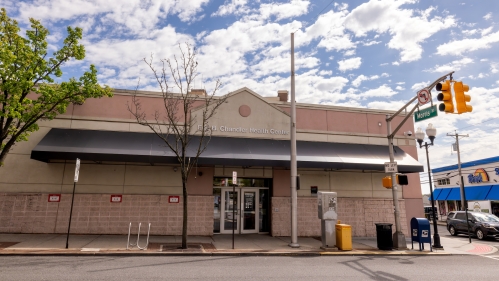
HIPHOP: Asylum Clinic
What We Do
The Asylum Clinic, an initiative of the Homeless and Indigent Population Health Outreach Project (HIPHOP), is a group of volunteer healthcare providers and students who conduct forensic medical and psychiatric evaluations for persecuted individuals. This service is provided to victims of torture from countries across the globe who are seeking asylum on multiple grounds, including persecution due to race, gender, religion, sexual orientation and political affiliation.
Our clinic volunteer providers and student scribes meet with clients to conduct forensic medical evaluations and to prepare a medical affidavit in support of a client's asylum application. Asylum seekers with legal representation and forensic medical affidavits are more likely to be granted asylum.
Our Mission
Robert Wood Johnson Medical School's HIPHOP Asylum Clinic provides forensic documentation of the physical and psychological manifestations of torture and ill-treatment as reported by individuals applying for immigration asylum in the United States. All services provided by the clinic are made available based upon the medical school’s determination, in its sole discretion.
The Model
Clients are seen by a faculty physician trained in conducting physical and psychiatric evaluations of asylum applicants and a medical student who assists in scribing and coordinating the visit. The faculty and student team then finalize the medical legal documentation for submission to the attorney.
What Care Do We Provide?
The clinic will only serve the needs of asylee applicants for the medical/psychological evaluation. It is not a medical care site. We will not be diagnosing or treating medical conditions. Best practice suggests that clinicians performing forensic evaluations should generally not be treating clinicians.
Why Get Involved?
The HIPHOP Asylum Clinic will offer both students and clinicians an invaluable learning opportunity and opportunity to work with the local community. The clinic offers a great way to use medical knowledge and training and apply it in service to our community.
Learn how to become a student scribe or volunteer physician at the Asylum Clinic.
History
The HIPHOP Asylum Clinic officially started in May of 2022 and has since partnered with multiple legal clinics across the NJ/NY region and completed over two dozen medical and psychiatric asylum evaluations.
Who We Are
Accordion Content
-
Faculty Advisors
Karen Lin, MD
Eric Jahn, MDProgram Director
Susan Giordano
-
Clinic Coordinators
- Kike Afolabi-Brown, M4
- Helen Gao, M4
- Cynthia Daut, M3
- Dean Pucciarelli, M3
- Lauren Formanski, M1
- Raga Bhagavathi, M1
Education and Development
- Kevin Frederiks, M4
- Aafreen Azmi, M3
- Sabeen Rokerya, M3
- Nishita Amancharla, M1
Outreach and Communications
- Sadia Ibrahim, M3
- Archana Kumar, M1
Contact Us
hiphop_asylumclinic@rwjms.rutgers.edu
Hours of Operation
Thursdays, 5 p.m.–7:30 p.m., as needed
Clinic Address
Hosted at Eric B. Chandler Health Center
277 George Street
New Brunswick, NJ 08901
Clinic Hours and Location
The clinic is open Thursdays, 5:30 p.m.–7:30 p.m., as needed
Eric B. Chandler Health Center
277 George Street
New Brunswick, NJ 08901
Frequently Asked Questions
Accordion Content
-
Individual clients are referred by service organizations and law offices that offer pro bono legal services to clients seeking asylum. If you are representing a client and would like to refer them for a medical or psychiatric evaluation, please email HIPHOP_AsylumClinic@rwjms.rutgers.edu to request a referral form. When the referral form is completed, we screen the information for appropriateness in our setting and set an appointment for evaluation.
-
Our mission is to serve all appropriate individuals seeking asylum, and we will not disqualify clients based on socioeconomic status, insurance status, or spoken language.
Get Involved
Eligibility Information
-
Student scribes must complete Physicians for Human Rights Asylum Medicine training. The training is online, free, and self-paced. Documentation of completion must be emailed to HIPHOP_AsylumClinic@rwjms.rutgers.edu, after which students will receive further information. The online training module can be accessed at https://asylummedtraining.org.
Student involvement will be focused on scribing, observation, and supporting key aspects of the history as well as any further involvement at the discretion of the faculty provider performing the evaluation.
-
Licensed physicians must be Physicians for Human Rights (PHR) trained and a Robert Wood Johnson Medical School faculty member to volunteer.
The PHR training is online, free, and self-paced. Documentation of completion must be emailed to HIPHOP_AsylumClinic@rwjms.rutgers.edu. The online training module can be accessed at https://asylummedtraining.org.
Frequently Asked Questions
-
Faculty volunteer physicians will be responsible for writing the affidavit, and submitting photos and body diagrams as needed to the referring attorney. The faculty physician also may be required to provide testimony at a deposition, trial or other court proceeding. These proceedings are generally scheduled at the convenience of the court. We will document consistent with the Istanbul Protocol and have developed a standard form to guide the production of high-quality documentation. We recommend that the completed documentation draft is ready for review by the attorney within two weeks of the evaluation date.
-
In order to volunteer at our clinic you must complete a Physicians for Human Rights (PHR) training. There are many different free training avenues that you may take, but it is important to note that they must be PHR trainings. We recommend registering for PHR training through the Asylum Medicine Training Initiative. This allows students and clinicians to follow a self-paced format, for a total of 7–8 hours of training. Some other training options include Society for Asylum Medicine and other PHR training. New clinicians are required to work under the guidance of an experienced clinician for a minimum of three affidavits.
Follow us on Instagram!
